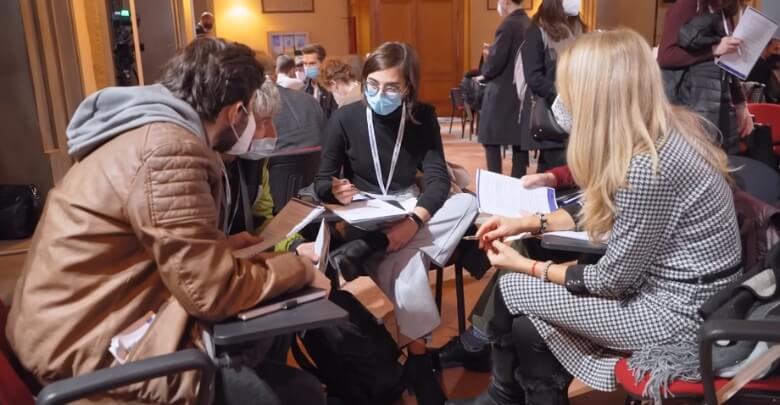Networking at a conference is an exciting opportunity to meet industry peers and establish valuable connections. But what happens after the event ends? How do you network after a conference?
The key is to take proactive steps to nurture the relationships you’ve started. Organize your contacts and connect with them on social media to keep the conversation going. Schedule follow-up meetings or calls to deepen these new connections, and aim for in-person meetups to solidify your relationships.
Remember, it’s not just about collecting business cards; it’s about building meaningful, long-term professional relationships. Find out how you can maximize your networking efforts after your conference by reading the following tips.
Why Networking at A Conference is Important?
Building connections is one of the most valuable aspects of attending a conference. It’s not just about listening to speakers or attending workshops—it’s about meeting like-minded people. Whether looking for career opportunities or sharing insights, networking helps create meaningful professional relationships that can lead to long-term success.
Conferences bring together individuals from different backgrounds, industries, and experiences. Engaging in discussions with attendees can open doors to new ideas and perspectives. A simple conversation during a break or a group discussion at a workshop might introduce you to valuable contacts. Networking strengthens knowledge, builds confidence, and enhances career growth.

Many events organize networking sessions to encourage interactions among participants. Social gatherings, panel discussions, and coffee breaks provide excellent chances to connect. The key is to be approachable and open to conversations. Asking questions, exchanging contacts, and following up after the event can make networking more effective and rewarding.
International conferences attract professionals from all over the world, making them a great place to expand your reach. Events like conferences in Canada provide attendees with the chance to meet experts, industry leaders, and peers in a dynamic environment. Taking part in such events can lead to collaborations, mentorships, and valuable career opportunities.
How Do You Network After a Conference?
It is essential to network after a conference in order to establish long-term relationships. Building meaningful relationships is more than exchanging business cards. You can maximize your networking efforts following conferences like a business management conference by following these tips.
Organize Your Contacts
Gather the contact information you collected during the conference and organize it. Keeping track of everyone should be done using a digital tool. This will assist you in remembering who they are and what they are relevant to you.
Make sure to categorize your contacts based on their priority and follow-up requirements. By doing so, you will ensure that your first contact is with those who are most important. As a result, you will be able to manage your time more effectively.
Connect on Social Media
Make use of social media platforms to connect with your new contacts. This keeps the conversation going and helps you stay updated. It also allows you to share content and insights relevant to your industry.
Engage with their posts and share valuable content. This keeps you on their radar and strengthens your relationship. Social media is a great tool for maintaining professional connections.
Schedule Follow-up Meetings
Plan follow-up meetings or calls to deepen your connections, as this shows your genuine interest in maintaining the relationship. Exploring effective ways to follow up after a conference can enhance the chances of future collaborations. It’s also a great way to discuss potential partnerships or shared projects.
It is best to make these meetings informal to develop a more personal relationship. A casual lunch or coffee meeting is an ideal choice for creating a relaxed setting. By taking this approach, you can foster a professional bond that feels natural and lasting.
Move Conversations Offline
Develop stronger relationships by moving conversations from the online to the offline environment. Face-to-face interactions create a more lasting impression. They also provide an opportunity to discuss ideas in depth.
In order to strengthen these relationships, arrange in-person meetings. Organize small gatherings or attend local industry events together. It is through these interactions that a more reliable network is created.
Build Meaningful Relationships
Focus on building meaningful relationships, not just expanding your contact list. Understand the interests and needs of your connections. This makes your interactions more valuable and relevant.
Show genuine interest in their work and offer help when possible. This approach builds trust and mutual respect. Meaningful relationships are the foundation of a strong professional network.
Follow Up Consistently
The key to maintaining your network is consistent follow-up. Keep in touch with periodic messages to share updates and to check-in. You will be able to keep your connections active and alive by doing this.
Maintaining regular contact demonstrates your commitment to the relationship. It also provides a platform for future collaborations. The key to maintaining a strong network is consistency.
Networking doesn’t end when the conference does. By following these methods, you can turn new connections into valuable professional relationships. Keep nurturing your network for long-term success.
Mistakes You Need to Avoid While Networking at A Conference?
It is beneficial to network at conferences in order to develop professional relationships. However, there are common mistakes you should avoid to ensure successful interactions. Incorporating these networking tips here can significantly enhance your ability to build meaningful connections. Remember to listen actively, ask thoughtful questions, and follow up right away to show that you value the relationship.
- Don’t dominate the conversation. Listen actively and show genuine interest in other’s ideas and experiences to build rapport.
- Avoid using generic questions. Instead, ask specific and thoughtful questions to engage more meaningfully with your new connections.
- Don’t forget to follow up. Timely follow-ups show you value the connection and are interested in continuing the relationship.
- Avoid talking only about yourself. Show interest in others’ work and achievements to create a balanced and engaging conversation.
- Don’t neglect your body language. Positive body language, like smiling and maintaining eye contact, makes you more approachable and friendly.
- Avoid being unprepared. Research key attendees or topics beforehand to engage in more meaningful and relevant conversations.
- Don’t stick to your comfort zone. Step out and meet new people instead of only talking to familiar faces or colleagues.
- Avoid giving out too many business cards. Focus on quality interactions rather than collecting or distributing as many cards as possible.
- Don’t ignore follow-up emails. Responding quickly to follow-up messages helps in maintaining the connection and shows your professionalism.
- Avoid negative conversations. Keep discussions positive and professional to leave a lasting and favorable impression on others.
Is Networking at A Conference Worth It?
Yes, networking at a conference is worth it. It provides invaluable opportunities to meet industry leaders and peers. The connections you make can significantly impact your professional growth. Here are the key benefits of networking at a conference.
Expanding Your Professional Network
You can expand your professional network by networking at an academic conference. Meeting new people can lead to potential collaborations and partnerships. You also get to know industry leaders and gain valuable insights. This expanded network can provide support and opportunities in your career.
Gaining Industry Insights
Conferences are excellent for gaining industry insights. You can learn about the latest trends and developments from experts. This knowledge helps you stay updated and competitive. Understanding industry changes is crucial for strategic decision-making.
Learning from Experts
The purpose of conferences is to provide a platform for learning from experts. Attendees gain firsthand knowledge from experienced professionals. These insights can enhance your skills and understanding. Learning from the best helps in personal and professional growth.
Discovering New Opportunities
Networking at conferences opens doors to new opportunities. You may find job offers, partnerships, or collaboration possibilities. These opportunities can significantly boost your career. Seizing such moments can lead to long-term benefits.
Building Meaningful Relationships
Building meaningful professional relationships is one of the benefits of attending conferences. Engaging face-to-face creates stronger bonds than virtual interactions. These relationships can provide ongoing support and guidance. Building strong connections is essential for career growth.
Enhancing Your Reputation
Attending conferences can enhance your professional reputation. Active participation and networking make you more visible in your industry. This visibility can lead to recognition and respect. A strong reputation opens more doors for opportunities.
Gaining Confidence
Gaining confidence is facilitated by networking at conferences. Interacting with diverse professionals enhances your communication skills. This boost in confidence is beneficial for your career. Confident networking can lead to more successful interactions.
Staying Motivated
Taking part in conferences can rekindle your motivation and passion. Hearing success stories and achievements inspires and energizes you. This renewed motivation helps in pursuing your goals. Staying motivated is crucial for continuous professional growth.
Accessing Resources
Networking gives you access to various resources. You can learn about new tools, technologies, and methodologies. These resources can improve your work efficiency. Access to the right resources is vital for career advancement.
Frequently Asked Questions About How Do You Network After a Conference?
Networking after a conference is crucial for building lasting professional relationships. Here are some frequently asked questions and their answers to help you guide post-conference networking effectively.
How Do You Send a Network Email After an Event?
Send a brief, personalized email thanking the person for their time. Mention a key point from your conversation to jog their memory. Suggest a follow-up meeting or call to discuss potential collaborations or shared interests further.
How to Follow up After an Academic Conference?
Follow up by sending a thoughtful email within a week. Reference specific discussions from your meeting and propose future collaboration or sharing of resources. This approach helps in maintaining the connection and exploring new opportunities together.
How to Connect on LinkedIn After a Conference?
Send a personalized LinkedIn invitation mentioning where you met. Add a brief message about your conversation to remind them of your encounter. Express interest in staying connected and potentially collaborating on relevant projects in the future.
How Long After a Conference Should You Follow Up?
Follow up within a week after the conference. This timely follow-up shows your interest and helps keep the interaction fresh in their mind. Timely follow-ups demonstrate professionalism and can lead to stronger, more meaningful connections.
Where Do You Put Conference Talks on Linked In?
Add conference talks under the “Experience” or “Projects” section. Detail your role, the conference name, and the talk’s title to highlight your involvement and expertise. This showcases your professional achievements and contributions to your network.
Final Thoughts
A conference is an excellent opportunity for networking that extends far beyond the conference itself. By taking proactive steps, you can turn initial meetings into long-term professional relationships.
So, how do you network after a conference? It’s all about staying organized, connecting on social media, scheduling follow-ups, and moving conversations offline. Remember to build meaningful relationships and consistently follow up to keep your network strong.
By doing so, you not only expand your professional network but also gain insights, discover opportunities, and enhance your career growth. Keep nurturing these connections for lasting success.







